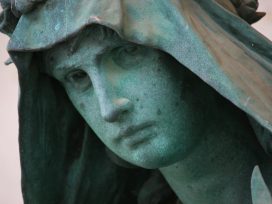
Two opposing interpretations of 1945 form the ideological core of today’s confrontation between Russia and the states of central and eastern Europe. Both are reactions to the collapse of the Cold War order.
Surrounding the anniversary of the end of WWII were arguments that national experiences are suffocated by the dominant discourse of the West. By implication, the memory of the Holocaust is a hegemonic discourse within the EU, rather than its binding principle. Here, it is not so much that national myths are suppressed, argues Isolde Charim, but that a new myth is in the making: that of victimhood divorced from political context.
Accompanying EU enlargement is a discourse that with increasing vehemence throws into question the idea of the European Union’s foundation upon a unifying principle. The intra-state debates on the complexities of individual pasts is thus shifted onto a European level. A central exponent of this debate is the well-known Polish journalist Adam Krzeminski, with his much-noted essay, “As many wars as nations. The myths and truths of World War II”.1 In Krzeminski’s view, the founding principle of the EU, which was supposed to have overcome the bloody differences of the past into a “Never again!” becomes the “founding myth”, one open to question on two counts.
First of all, Krzeminski argues, there is not one myth but many – as many as there were nations involved in the wartime occurrences. Each developed its own national narrative of the events. Hence the title of his essay. Second, these myths would have anything but a unifying effect: he diagnoses far more a “clash” of national myths – to use his suggestive word. According to his findings, not only is there no shared perspective on the period of 1939-1945 – the respective national narratives also compete. For Krzeminski, the commemoration of World War II is far more divisive than unificatory. This division resolutely obstructs the project of European unification in the future.
Let’s be clear: Krzeminski maintains that the idea of a “founding myth” is itself a myth – in other words, a hegemonic project that allows a particular narrative of the past to predominate, thereby suppressing both differing experiences and the various mythologizations.
Let’s attempt to understand what that means. Krzeminski rejects not only the formerly dominant war narratives of the US and the USSR, which abused these national narratives for various forms of legitimation. Krzeminski also denies that the Holocaust, the central perspective on the events since the 1970s, forms a common basis of the EU. The status of the industrialized mass murder as a common European experience is repudiated. In his view, then, the Holocaust appears insufficient as a founding myth of the EU, since it means a universalization that suppresses national experiences. Implicitly, the narrative of the Holocaust likewise becomes a hegemonic discourse with regard to the EU. Precisely the same argument is made by Timothy Snyder in his article “Balancing the books”:2 the experience of the East, according to Snyder, is not incorporated into the EU. This, supposedly, is the reason for the lack of European unity and solidarity. Krzeminski’s distinction between traumatic experience and mythologization is entirely absent in Snyder. He talks only about the experiences of the East – which is to say, the suffering experienced by the East. However, both take the line that real unification of Europe would only be possible if Europe was able to integrate its new members’ wartime experiences. Apparently, it is a matter of correcting the dominant narrative of the EU and introducing a version of history that would arrive at the formerly suppressed historical truth. This confrontation is about recognizing the experiences of the East, in other words, about recognizing its suffering. That is the central perspective. The implications are twofold.
On one hand, it departs from the view that the role of the victim between 1939 and 1945 is defined unequivocally. In other words, the memory of the Jewish genocide implicitly turns into the Jewish “monopoly on suffering”, into a narrative that obscures the honouring and recognition of all other victims. On the other hand, the distrust of the European politics of commemoration, which is evaluated as a new hegemonic project, becomes apparent.
All in all, however, it seems that such positions misjudge current developments. This can be better observed through the French Lacanian Jean-Claude Milner. Milner draws a picture in which a European demos develops from the idea of one people, in other words, a limited whole, into an unlimited whole, which tends towards complete inclusivity and increasingly recognizes no exceptions. Through constant enlargement, Europe becomes what the psychoanalyst Jacques Lacan called the “not-all”: an open, unlimited, all-encompassing unity. The condition for such a Europe, however, is “the effacement of all divisive historical traditions and legitimations” – as opposed to Krzeminski, who sees the return and the “clash” of confrontational national myths: the continuation of war through the means of commemoration.
One must therefore object to Krzeminski via Milner: the liberation from the divisive narratives hoped for by the former took place long ago – and events, such as the non-participation of Lithuania and Estonia in the celebrations in Moscow that he mentions, are just one side of the development. The other, more persistent side is, as Milner reveals, moving in precisely the opposite direction: increasingly, national differences in memory are being waived. However, they are not being suppressed or repressed in the process. It’s much more the case that we are experiencing the formation of a new myth, one woven precisely from these narratives: national legends and tales of heroism are being replaced by those of one’s own suffering and victimization. In this sense, texts such as the ones mentioned are performative: they contribute to the construction of the new myth. The moral equation of all victims of World War II has long since moved on from revisionism to common discourse that calls for the general recognition of suffering – be it that of the Germans as a result of the Allied bombing, or that of displaced persons.
In the days of the former Federal Republic of Germany, it was a matter of complete empathy with foreign victims. I can remember an episode of Lindenstraße – a television series that knew how to translate all German complexes into everyday conflicts – in which this compulsion was perfectly expressed: a teenage girl, in a fit of pubescent rebellion, shaved her head to remind people of an inmate of a concentration camp. Today, this “impossible empathy”, this “unacceptable identification” (Diederich Diederichson), has shifted vehemently from foreign victims to the discovery of one’s own victimhood. If today there is a “clash” of memories, then it is one of competing victim counts. It is fundamental that the new narrative, one supposed to bring about European unity and include the recognition of all victims, can only be attained through the dilution of the concept of victim to a general human concept overlooking a differentiation between victim and perpetrator.
In the West, this is being realized through the privatization of commemoration. Emotional history is rapidly taking up the entire space of memory. The period between 1939 and 1945 is narrated as a subjective experience of suffering. This opens up a biographical perspective on history. Today, sixty years later, this means primarily a kind of family memoir that is no longer tied to the author’s experience. Naturally, what results is a construction that attempts to rationalize and to exculpate – in short, to make good. History as the memory of family suffering is written primarily under the pretext of understanding.
Rather than foregrounding social and political contexts, such privatizations emphasize the human being as an individual. It can now be argued – and this is precisely what is happening everywhere – that this represents a gain in historical concretization. In fact, it promotes the de-politicization of history. This is because the personal is at the same time also an abstraction: abandoning all more precise definitions, it short-circuits the experiences of the individual directly with general human suffering, in a newly defined, universal concept of victimhood. Thus an entirely new victim myth forms, one which fits seamlessly into the current discussion of the politics of commemoration.
This new victim status is ambiguous: on one hand, it means subsumption under the category of the general human; on the other hand, it authorizes “the goal of an increase in individuality” (Norbert Frei), since recognition as victim brings surplus of identity. This consists not least in a new subjectivity, which can, to use the terms of the French philosopher Alain Badiou, be formulated as such: “Human is that which is able to recognize itself as victim.” To many historical narratives, this may appear as a liberation. If it should turn out that this is the specific European subjectivity – that “shared European culture” which Snyder is looking for – then it would be a perverted realization of the European founding principle. Whatever the case, the objection must be levelled against Snyder and Krzeminski that until now it has been possible to achieve a common perspective on the past only through a loss of concreteness and a de-politicization of commemoration, and not through a gain in truth.
Adam Krzeminski, "As many wars as nations. The myths and truths of World War II", trans. Antonia Llloyd-Jones, sign&sight [online magazine], 6 April 2005, http://signandsight.com/features/96.html, accessed 8 September 2005. First published in Polish in Polityka 23 March 2005.
Published 30 September 2005
Original in German
Translated by
Simon Garnett
© Isolde Charim / Eurozine
PDF/PRINTSubscribe to know what’s worth thinking about.

Two opposing interpretations of 1945 form the ideological core of today’s confrontation between Russia and the states of central and eastern Europe. Both are reactions to the collapse of the Cold War order.

Although incoming migrants are demonized in political discourse, many European countries are struggling with a loss of population. In this episode of Standard Time, Eurozine’s colleagues talk about the idea of ethnic purity, outmigration, and finding a sense of belonging.